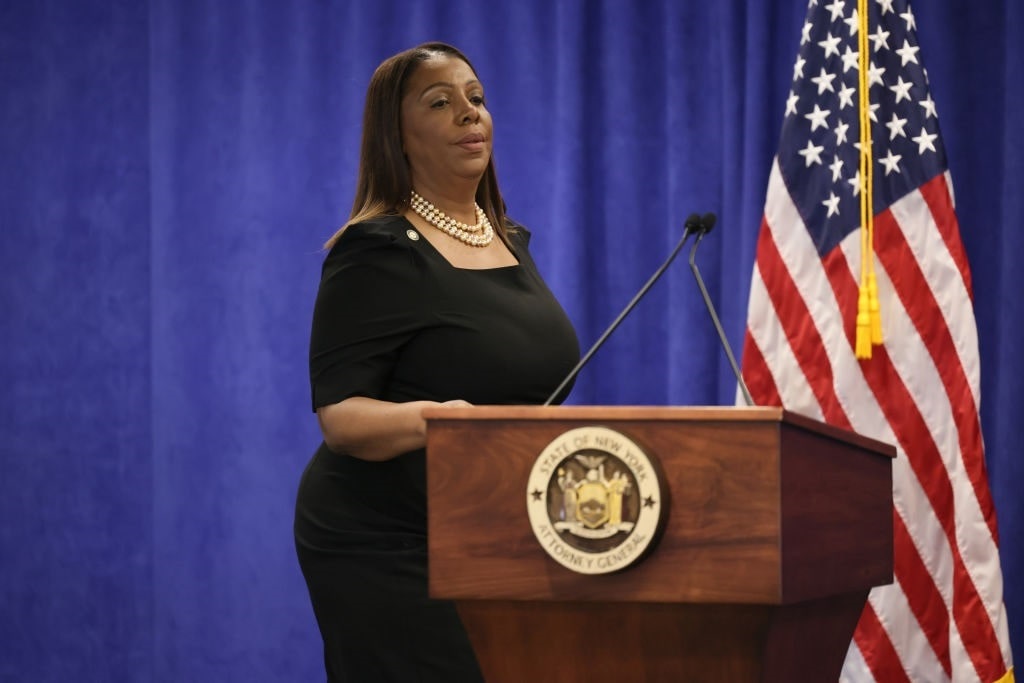Just hours before the March 25 deadline to pony up a bond of more than $450 million in New York, former President Donald Trump was handed a significant win by the state supreme court’s Appellate Division. The five-judge panel determined that Trump had a further ten days to post only $175 million as a bond to appeal the civil fraud verdict against him brought by Attorney General Letitia James. As well as the striking reduction in cash payouts, several other factors imposed by Judge Arthur Engoron were also put on hold.
What happens next for Trump? And will James continue her threats to seize assets? We spoke with Liberty Nation’s legal affairs editor, Scott D. Cosenza, to examine the case’s future.
A Last-Minute Win
Mark Angelides: Scott, I thought the deal was that Donald Trump had to post half a billion dollars before this verdict could be appealed.
 Scott D. Cosenza: That was true when Judge Engoron called the shots. The Appellate Division judges seemed to think well under half of that amount was sufficient. Trump’s hope is that in time they will see the entire judgment as improper, but he can likely post this amount without a fire sale, something James had hoped for.
Scott D. Cosenza: That was true when Judge Engoron called the shots. The Appellate Division judges seemed to think well under half of that amount was sufficient. Trump’s hope is that in time they will see the entire judgment as improper, but he can likely post this amount without a fire sale, something James had hoped for.
MA: What parts of Engoron’s ruling have been halted? And why do you think the judges decided to intervene? Does it suggest they believe the decisions against Trump were too harsh?
SDC: The provisions of Engoron’s order that were suspended until appeal are harsh measures to be sure, including a complete ban on being a corporate officer for three years and on applying for a loan from any New York financial institution for the same term. Trump’s real estate organization depends entirely on being able to take advantage of mortgages from New York banks, for instance – so these restrictions would have hobbled a significant portion of his business activities.
That doesn’t necessarily make the restrictions improper, however. Under the right circumstances, they may be just what society and justice demand. Such facts aren’t present here, in my opinion, and it’s a fair bet that’s true of the state appellate court judges, too. But this order did not come with a written opinion to support it, which would have explained the judges’ reasoning, so supposing is all we may do presently.
MA: I can’t help but wonder, Scott, if the appellate decision was in part due to the vast amount of bad press New York is getting from other businesspeople – including those who are no fans of Trump. When you have big-name investors saying they won’t put another cent into New York real estate, surely that’s a warning shot.
SDC: I hope that did not motivate the judges to reduce the award because it would be improper. A defendant’s rights should never depend on the reaction of others. Remember the wrong that is being corrected here: In this case, Trump’s “victims” (the most sophisticated mortgage bankers in the country and the rest of the world) did not want him prosecuted, claimed that they were not victims, and wished to continue doing business with him. If he had been found liable for bilking widows and orphans for a billion in ill-gotten gains, it might have gone differently.
Letitia James – Are Her 15 Minutes Over Yet?
MA: It appeared that prior to this appeals division ruling, James talked in an unseemly manner about how she was going to seize Trump’s properties and assets. To many observers, it seemed she was taking perverse glee in the troubles Trump had in trying to secure a half-billion-dollar bond. What is her mood now?

Donald Trump (Photo by Curtis Means-Pool/Getty Images)
SDC: The prospect of seizing Trump’s property and seeing him ruined seemed to animate her existence, and her media appearances show a passion for relentlessly pursuing Trump. If only she had turned her fervor against those who make daily life in New York a dystopian fever dream of random attacks and general lawlessness! She released a statement that the $464 million judgment still stands. And it does – for now.
MA: Now that Trump has said he will post the $175 million appeal bond in cash – or securities – is James’ role in this over? Is there any behavior that she could engage in – based on her past performance – that could serve the former president well in his appeal?
SDC: To answer the second question, Trump will certainly focus on her wildly inappropriate statements – from her campaign for office until the present day – to advance his appeal. She said the quiet part out loud, and that is to Trump’s favor. James is still very much a part of the process; it’s her office that will be fighting Trump’s appeal.
MA: I’d like to know about the next steps for Trump. Where does his appeal go from here? All the way to the US Supreme Court?
SDC: Trump may be willing to take the issue to the Supreme Court, but it won’t accept most cases. I have had parking tickets I gladly would have appealed to the Supreme Court. New York has an odd naming structure for the state courts – the lowest level of state trial court is called the supreme court. The court of final appeals is called the New York Court of Appeals. Trump would have to lose in both of those courts before challenging Engoron’s judgment in federal court. Then he would have to start with a federal district court, followed by the First Circuit Court of Appeals before going to the US Supreme Court.
MA: It seems to me, Scott, that these efforts by James and even Judge Engoron have tainted New York City. A perusal of social media suggests that many people see it as a corrupt hellscape riddled with crime that goes unpunished and a legal class that would rather score political points than protect its citizens. In fact, the exodus of people indicates that even in New York, this is a widespread view.
Can the Big Apple courts ever regain their lost reputations?
SDC: In good conscience, I can’t imagine advising anyone to center their business or personal life in that jurisdiction. There is no party competition for leadership, with predictable results.




